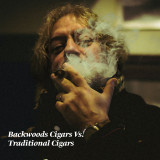Little Cigars vs. Cigarettes: Key Differences
Understanding the nuances between little cigars and cigarettes can be daunting, given their superficial similarities. However, upon closer examination, distinct differences emerge that are paramount for discerning consumers and enthusiasts alike. This article delves into the key distinctions that separate little cigars from traditional cigarettes.
Composition and Ingredients
Little cigars and cigarettes diverge significantly in their composition. Little cigars, such as Swisher Sweets and Captain Black, are crafted with a tobacco blend wrapped in a tobacco leaf or a reconstituted tobacco paper. This provides a unique flavor profile and smoking experience. In contrast, cigarettes typically consist of a finely cut tobacco blend enclosed in paper. The inclusion of additives and chemicals in cigarettes is often more pronounced, aimed at enhancing flavor and prolonging shelf life.
Size and Appearance
Size is another differentiating factor between little cigars and cigarettes. Little cigars are generally thicker and slightly longer than cigarettes. They resemble traditional cigars in appearance, often featuring a brown wrapper that gives them a classic, rustic look. This aesthetic distinction is particularly evident in brands like Winchester Little Cigars. On the other hand, cigarettes possess a uniform, slender appearance with a white paper wrapper and a filter tip.
Flavor and Aroma
Little cigars offer a wider array of flavors compared to cigarettes. Brands like Swisher Sweets are renowned for their diverse flavor options, ranging from fruity to more traditional tobacco tastes. This variety appeals to consumers seeking a customized smoking experience. Conversely, cigarettes tend to provide a more consistent tobacco flavor, with fewer variations. The aroma from little cigars is often richer and more pronounced, attributed to the tobacco leaf wrapper and flavoring agents used.
Taxation and Regulation
An often-overlooked aspect is the regulatory and taxation framework governing little cigars and cigarettes. In many jurisdictions, little cigars are taxed at a lower rate than cigarettes due to their classification as cigars. This can result in a price differential that influences consumer choice. However, the regulatory landscape is continually evolving, with increasing scrutiny on little cigars due to their rising popularity and potential health implications. Understanding these regulatory nuances is crucial for consumers and retailers alike.
Health Considerations
While both little cigars and cigarettes pose health risks, public perception and scientific consensus often portray cigarettes in a more negative light. The combustion of tobacco in both products releases harmful chemicals and carcinogens. However, the perception of little cigars as a less harmful alternative persists, primarily due to their cigar-like appearance and marketing. It is essential for consumers to be informed about the health risks associated with both products.
In conclusion, while little cigars and cigarettes may appear similar at a glance, they differ significantly in composition, appearance, flavor, and regulatory treatment. Brands like Swisher Sweets, Captain Black, and Winchester Little Cigars offer unique experiences distinct from traditional cigarettes. Understanding these differences is vital for making informed decisions and appreciating the distinct characteristics each product offers.
Recent Posts
-
Backwoods vs Traditional Cigars: Flavor & Experience
Cigars are celebrated for their unique flavors, meticulous craftsmanship, and cultural significance …11th Sep 2025 -
Best Cigar and Bourbon Pairings for Every Aficionado
Best Cigar and Bourbon Pairings for Every Aficionado Pairing a fine cigar with a glass of bourbon i …10th Sep 2025 -
Swisher Sweets Seasonal Flavors You Need to Try
In today's competitive tobacco market, swisher sweets has carved a niche with its innovative season …9th Sep 2025




